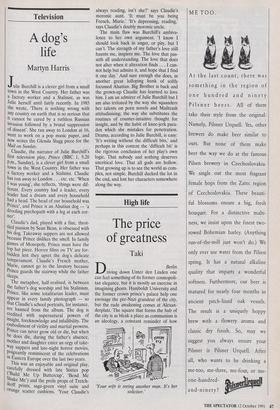Television
A dog's life
Martyn Harris
Julie Burchill is a clever girl from a small town in the West Country. Her father was a factory worker and a Stalinist, as was Julie herself until fairly recently. In 1985 she wrote, 'There is nothing wrong with any country on earth that is so serious that it cannot be cured by a ruthless Russian invasion followed by a brutal suppression of dissent'. She ran away to London at 16, went to work on a pop music paper, and now writes the Glenda Slagg piece for the Mail on Sunday.
Claudie, the narrator of Julie Burchill's first television play, Prince (BBC 1, 9.20 P.m., Sunday), is a clever girl from a small town in the West Country. Her father was a factory worker and a Stalinist. Claudie has run away to London . . . etc. etc. 'When I was young', she reflects, 'things were dif- ferent. Every country had a leader, every leader had a dream and every household had a head. The head of our household was Prince', and Prince is an Alsatian dog — 'a drooling psychopath with a leg at each cor- ner'.
Claudie's dad, played with a fine, throt- tled passion by Sean Bean, is obsessed with his dog. Takeaway suppers are not allowed because Prince dislikes the smell. In family games of Monopoly, Prince must have the top hat piece. Horror films on TV are for- bidden lest they upset the dog's delicate temperament. Claudie's French mother, Marie, cannot go to the lavatory because Prince guards the stairway while the father sleeps.
The metaphor, half-realised, is between the father's dog worship and his Stalinism. Prince, like some totalitarian leader, must appear in every family photograph — so that Claudie's school portraits, for instance, are banned from the album. The dog is credited with supernatural powers of insight, foreknowledge and infallibility. The embodiment of virility and martial prowess, Prince can never grow old or die, but when he does die, during the father's absence, mother and daughter enter an orgy of take- way suppers and late-night horror movies, poignantly reminiscent of the celebrations in Eastern Europe over the last two years.
This was an enjoyable and original play, carefully dressed with late Sixties pop ( Build Me Up Buttercup', 'Bend Me Shake Me') and the prole props of Tretch- ikoff prints, sage-green vinyl suite and orange scatter cushions. 'Your Claudie's always reading, isn't she?' says Claudie's moronic aunt. 'It must be you being French, Marie.' It's depressing, reading,' says Claudie's doubly moronic uncle.
The main flaw was Burchill's ambiva- lence to her own argument. 'I know I should look back in anger, or pity, but I can't. The strength of my father's love still haunts me, inspires me. The love that pas- seth all understanding. The love that does not alter when it alteration finds . . . I can- not help but admire it, and hope that I find it one day.' And sure enough she does, in another great lolloping hunk of softly focussed Alsatian. Big Brother is back and the grown-up Claudie has learned to love him. I am an admirer of Julie Burchill but I am also irritated by the way she squanders her talents on porn novels and Mailtrash attitudinising; the way she substitutes the routines of counter-intuitive thought for insight, and by the habit of knee-jerk para- dox which she mistakes for penetration. Drama, according to Julie Burchill, is easy: `It's writing without the difficult bits,' and perhaps in this context the 'difficult bit' is the rigorous conclusion of her play's own logic. That nobody and nothing deserves uncritical love. That all gods are hollow. That growing up is to see the world as com- plex, not simple. Burchill ducked the lot in the end, and lost her characters somewhere along the way.


























































 Previous page
Previous page